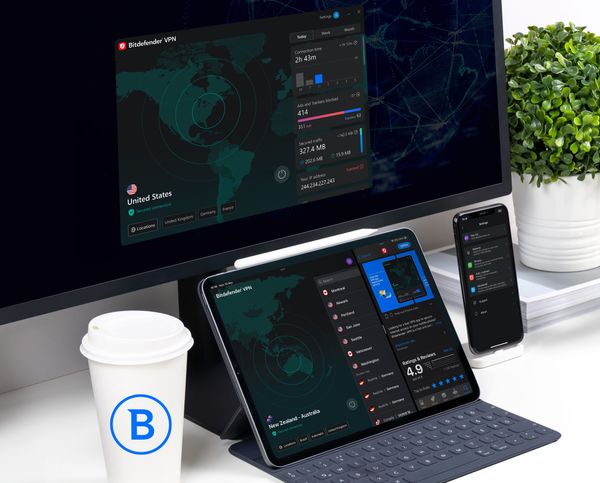Achieving Peace of Mind as a Digital Nomad: A Privacy Guide

In the last few years, we discovered the term Digital Nomad and grew accustomed to it. The term, however intriguing, simply describes remote workers who travel to different locations and work from there.
The traveling and remote working combo quickly consolidated itself into a phenomenon, as the number of digital nomads surged worldwide. In 2021 statistics counted no fewer than 35 million digital nomads worldwide.
Some of these individuals are perpetual travelers who seldom stay for more than a few weeks at a location. Others prefer a settlement-like approach that involves spending at least a few months at their establishments. On dedicated forums, they are often referred to as “perpetual travelers” and “slowmads.”
Regardless of their travel preferences, digital nomads face similar challenges, especially when it comes to security and online privacy. Moving from one location to the next makes digital nomads prone to cyberattacks and privacy violations. On the bright side, a VPN can help them steer clear of these unfortunate scenarios.
VPN boosts connection security
It’s worth mentioning that even solid VPN solutions can’t replace antivirus and anti-malware specialized software. However, this doesn’t mean VPNs don’t come with hefty security features.
VPN technology can redirect network traffic through secure private tunnels away from prying eyes, so that ISPs, network administrators and snoops can’t monitor your traffic. Considering that digital nomads often connect to public Wi-Fi networks in places such as coffee shops, airports and hotels, this additional layer of protection should be an essential asset in their arsenal of tools.
Furthermore, VPNs also encrypt relayed traffic so that, even if malicious actors found a way to interpose themselves between the user and their accessed online resource, they wouldn’t be able to make sense out of it. Sturdy VPN solutions, such as Bitdefender VPN, use 256-bit encryption, which is virtually impossible to crack.
A VPN’s traffic redirection and encryption features give digital nomads a fighting chance against security breaches and privacy violations while they’re traveling.
Keep your privacy safe while abroad
As a digital nomad, you have enough on your plate. You face unexpected costs, burnout, uncertain housing conditions, worries about sustainable income, visas, taxes, loneliness and physical theft. Solving the issue of online privacy could lift at least some of the burden off your shoulders.
For a long while, privacy wasn’t regarded as a priority. Most Internet users would argue that guarding your privacy is pointless if you have nothing to hide. However, many of these claims were proven wrong in time as more and more obscure privacy invasion techniques surfaced.
Many online entities, including ISPs, network administrators, and threat actors could monitor your online activity. While simply monitoring traffic is often benign, these entities could use harvested data against you by selling it, handing it out to third parties, or using it to blackmail you.
A dependable VPN such as Bitdefender VPN could help you achieve peace of mind by putting your privacy behind an impenetrable wall.
Avoid online tracking wherever you may roam
One of the most disputed forms of privacy violation is online tracking. Unfortunately, frequent relocation doesn’t exempt digital nomads from being followed and profiled by invisible eyes, which invites a series of drawbacks.
It’s no longer a secret that the Internet is a heterogeneous entity, and perhaps one of its most distinguishing traits is its shapeshifting ability. In other words, online content can adapt to the profile of whoever accesses it. While this doesn’t sound immediately bad, it can bring numerous advantages to the entity that controls the content.
Trusted VPN providers design their products with privacy in mind. As such, relying on VPN technology from a competent provider can help you escape the virtual bubble that online tracking services have built around you, digital nomad or not.
Modern solutions such as Bitdefender VPN go the extra mile to give you an edge against online tracking through ad-blocker and anti-tracker modules.
Avoid unfair limitations or market manipulations
Shedding the artificial persona that online trackers built around you allows you to freely access the Internet, with minimal to no interruptions or censorship.
You’ve probably heard about companies adapting their services to their customers’ profiles. While offering customers a tailored experience may sound harmless, it often means that certain customers get an advantage based on demographics such as sex, education, race and location.
Typically, online services shouldn’t have these details about you unless you deliberately provide them. However, technological advancements have made it possible to build intricate personal profiles using data supplied by online tracking mechanisms.
A VPN can help you avoid artificial market manipulations and unfair limitations so you can get services and products, including airplane tickets, housing, rentals and online subscriptions, as you normally should.
If you’re a digital nomad working from another country, you may notice that services and products you previously used are priced differently. A VPN can help you check if different locations practice lower prices by simply connecting to a server from another country.
However, keep in mind that using a VPN to avoid sales tax and other forms of taxation is a crime and can attract dire consequences. While traveling to another country, it’s your sole responsibility to read and understand its laws and regulations to avoid penalties.
tags
Author

Vlad's love for technology and writing created rich soil for his interest in cybersecurity to sprout into a full-on passion. Before becoming a Security Analyst, he covered tech and security topics.
View all postsRight now Top posts
How to Protect Your WhatsApp from Hackers and Scammers – 8 Key Settings and Best Practices
April 03, 2025
Outpacing Cyberthreats: Bitdefender Together with Scuderia Ferrari HP in 2025
March 12, 2025
Streamjacking Scams On YouTube Leverage CS2 Pro Player Championships to Defraud Gamers
February 20, 2025
How to Identify and Protect Yourself from Gaming Laptop Scams
February 11, 2025
FOLLOW US ON SOCIAL MEDIA
You might also like
Bookmarks








